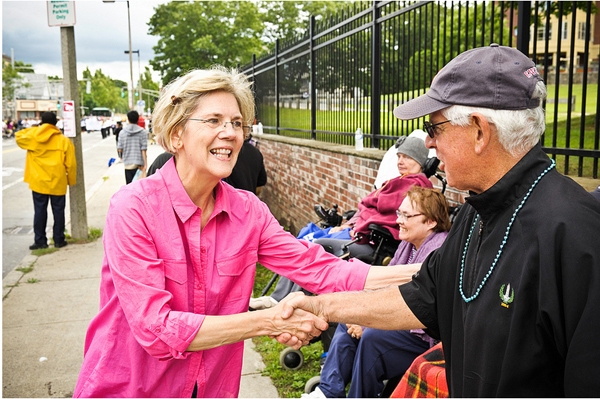How Qualified Female Candidates Win Elections
 Photo by ElizabethforMA on Flickr
Photo by ElizabethforMA on Flickr
It’s been widely noted that female candidates made big gains in this year’s election, in part due to their strong defense against the right’s “war on women.” But how, exactly, did they get it done? New research released today from the Boston-based Barbara Lee Family Foundation found some key factors that helped female candidates gain traction with voters and overcome the “double bind of being both likable and qualified at he same time,” Lee said. And part of what’s shocking is how simple they are.
The BLFF, working in conjunction with Lake Research Partners, conducted surveys and polls of U.S. voters, and found that one-third of voters believed that their friends and neighbors would perceive a female candidate to be less qualified than a male candidate. (The “friends and neighbors” question is often asked in order to get a truer reading of how voters really feel.) But they found that simply telling a potential voter that a woman was qualified made a big difference, i.e. “I am candidate Jane, and I am qualified…” Using words like assertive, knowledgeable, confident, and leader early on in a campaign also helped make voters comfortable with prospective female candidates.
The research also found that women candidates are held to a higher standard and have to be ready to play as soon as they get out of the gate. Voters are less inclined to forgive female candidates if they make mistakes early on in a campaign, and those mistakes injure her perceived likability just as much as they injure her perceived qualifications. Prospective female politicians are expected to answer tough questions from journalists and have their game faces on from the outset of a campaign. “There’s no room for ramping up” a campaign over time, said Celinda Lake, President of Lake Research Partners, noting that “women paid a heavier price” if they did.
The semantics a female candidate uses during rallies, debates, stump speeches, and interviews also matter. It’s hardly surprising, but the more assertive a candidate is, the more likely she’ll convince voters that she’s qualified. Using proactive language, like “refusing to back down,” will cleave them to the public. But only to a point. Certain phrases can actually undermine her authority. Using “‘We’ rather than ‘me’ does not work to convey qualifications to voters,” says Lake. What does work? Using “action-oriented language, taking charge, and giving specifics.”
Finally and most tellingly, female candidates need third-party validation—from the business community, other political leaders, or unions for example—to ensure that voters trust their qualifications. “It’s always frustrating to know that we have to have someone validate our experience,” says Lake. As an example, she noted that even while voters like when a man or woman introduces an economic plan, they want to know who endorses the plan if it’s put forth by a woman.
So if you voted for a woman this election cycle, think back and see if it was these four factors helped her convince you she was the real deal.


